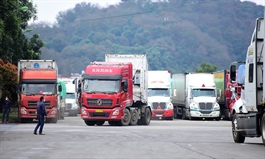Caution urged for SME fund processes
Caution urged for SME fund processes
With many small- and medium-sized enterprises having difficulties accessing financial resources to improve their capability, the Small- and Medium-sized Enterprises Development Fund under the Ministry of Planning and Investment is aiming to meet their greater financing needs.

Through the SMEDF, small- and medium-sized enterprises can take advantage of preferential interest rates. Photo: Le Toan
|
Small and medium-sized enterprises (SMEs) account for around 98.1 per cent of the more than 750,000 businesses operating in Vietnam and are undoubtedly the backbone of the domestic economy. However, many of them have encountered enormous roadblocks in securing timely financing, despite playing a major role in economic growth and job creation.
As part of the Ministry of Planning and Investment (MPI), the Small- and Medium-sized Enterprises Development Fund (SMEDF) was specifically designed for SMEs planning to create products in value chains or expand their footprint.
The fund, created in 2016, has become a trustworthy partner on granting preferential tailor-made loans to help SMEs improve.
The SMEDF is also cooperating with other local commercial lenders, such as Military Bank, Saigon-Hanoi Bank, and BAC A BANK to provide top-notch lending services for this segment.
Specifically, SMEs can enjoy preferential interest rates, as well as various support from the fund, which is currently mulling over implementing a direct lending scheme to better assist companies.
The direct process is based on Decree No.39/2019/ND-CP from 2019 on the organisation and operation of the SMEDF; and Circular No.14/2020/TT-BKHDT on handling risks in the fund’s direct lending activities, as well as direct lending regulations and processes.
One of the key challenges that SMEs in Vietnam continue to face is limited access to credit. Recent research on SMEs in Vietnam conducted by John Rand and Finn Tarp at the University of Copenhagen found that about 25 per cent of SMEs face credit constraints and that the demand for credit among small businesses is 115 per cent greater than supply.
This is the reason why informal credit markets are playing such a large role for many SMEs, particularly for micro and small businesses, according to the United Nations Development Programme (UNDP).
The unmet financing needs of SMEs in developing countries are estimated at around $5.2 trillion annually. During the pandemic, access to financing from traditional banks has dried up even more, which has contributed to slowing economic growth.
Elsewhere, a prominent example is Japan Finance Corporation which specialises in supporting unsecured loans of small enterprises and startups.
“Lending for startups is considered an extremely risky sector, because there is no financial data, no transaction results, and reliable information. That’s why we could not apply the conventional approaches to startup financing,” said Nguyen Trong Hieu, lecturer from Hanoi University of Business and Technology.
“I believe the SMEDF could learn from the experience of Japanese peers, especially with their major focus lying on the visions of entrepreneurs and their solid business plans,” he added.
Nguyen Duc Thuan, director of the Vietnam Environment Protection Fund under the Ministry of Natural Resources and Environment, shared his experience on loans disbursement and examination. “Before granting loans to any businesses, funds must ensure checking information from the Credit Information Centre, as well as double-check their financial capacity and debt payment ability. As a state-owned fund, the SMEDF should take a very cautious view on conducting evaluation and loan appraisals processes.”
Do Thi Bich Mai, general director of VietinBank’s Hoang Mai Branch, noted that SMEs in Vietnam usually depend on internal funds or borrowing from entrepreneurs, relatives, and friends. “Thus, they are in need of public support and venture finance. The pandemic has further decreased the cash flow and working capital of SMEs,” Mai said. “Even some major asset management companies are more interested in purchasing sour debts associated with large collateral from banks. That could pose a real challenge for funds like the SMEDF if any non-performing loans incur.”
Conventional methods of commercial banks, which specialise in large corporations, are more likely to help lenders gaining a solid return, while providing loans for SMEs might be less profitable and more troublesome.
Jonathan Pincus, economist at the UNDP, pointed out some challenges for SMEs accessing bank credit, including their low value of physical assets, principal-agent problem, and over-leveraging during the coronavirus pandemic.
“Public support in SME financing has been around for a while. For instance, in India, its ministry of MSME’s credit guarantee scheme will guarantee up to 85 per cent of unsecured loans with a maximum of $300,000,” said Pincus. “SMEs could enjoy their preferential conditions from the Small Industries Development Bank of India. Yet, the scheme also presents issues, such as low processes and non-tradable guaranteed loans.”



























